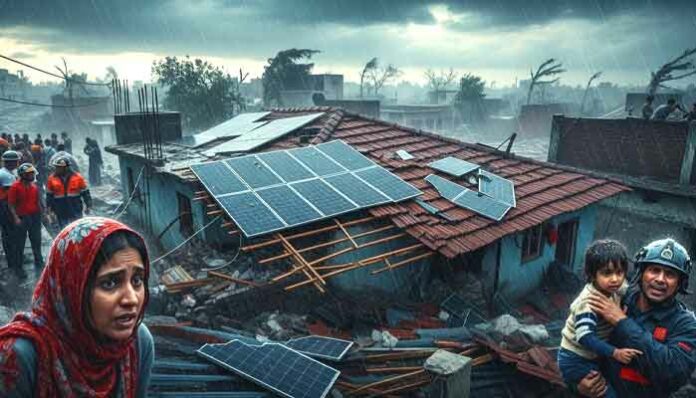Punjab Rain Causes Heavy Damage to Buildings and Homes
Punjab has witnessed several building failures recently. As reported by the head of the disaster management authority, 124 such incidents have taken place across the province during Punjab Rain. Authorities are continuing to monitor the situation closely.
Many homes and buildings in Punjab couldn’t stand against the recent stormy weather. Strong winds tore through towns during Punjab Rain, and experts from the disaster department say that rooftop solar panels, which weren’t fixed properly, made the damage worse. Now, teams are working to prevent such risks in the future.
Irfan Ali Kathia, the head of Punjab’s disaster management, recent weather was something never seen before and went beyond what anyone thought could happen because of Punjab Rain.
People were warned about the possibility of strong rain, but the actual storm surprised everyone with its intensity. He openly said that no one had expected Punjab Rain to be this severe.
Punjab Rain Highlights Building Safety Risks and Climate Change Warnings
The safety of buildings across Punjab remains a serious concern. Kathia reported that so far, officials have identified 124 cases of structural failure, with nearly 80% linked to rooftop solar panels installed without proper safety measures. Moving forward, authorities must implement stronger measures to prevent such incidents related to Punjab Rain.
Building safety continues to be a major priority in Punjab, especially in light of recent structural failures. Authorities have raised concerns about the growing number of collapses, with investigations showing that nearly 80% of these incidents were directly linked to the poor or unregulated installation of solar panels.
Only a limited number of collapses were caused by other reasons, such as construction flaws or natural wear and tear. While the push towards clean and renewable energy is commendable, he stressed that it must go hand in hand with strict safety standards. Without proper planning and secure installation practices, the risks to both people and property will remain dangerously high.
Unusual weather events now occur more frequently in the region. The head of PDMA explained that recent extreme conditions clearly show the impact of ongoing climate change. He noted that while the world’s temperature has risen by just one to two degrees Celsius, Pakistan’s temperature has increased more sharply by four to five degrees, triggering more frequent and intense heat waves. These changes clearly warn that we must take stronger action to protect the environment.
The effects of climate change are becoming harder to ignore. He mentioned that while the global temperature has increased by about one to one and a half degrees Celsius, this summer marked the second year in a row with a sudden 7-degree rise, causing extreme heat waves. Such drastic changes highlight the urgent need for action.
Punjab Rain Shows Urgent Need for Climate Action
Changes in the climate are becoming impossible to ignore. Kathia encouraged people to prepare for worsening weather conditions, explaining that the increase in temperatures is causing more extreme and dangerous weather patterns.
Addressing these challenges requires firm and consistent action. The government has intensified its efforts by improving water supply systems and introducing advanced warning systems some of which are powered by artificial intelligence for faster and more accurate alerts. However, Kathia pointed out that real, long-lasting solutions will only be possible if regions collaborate closely and create strong, forward-looking plans. Without unified efforts and intelligent long-term strategies, these issues are likely to grow even more severe.
Finding real solutions to rising temperatures requires strong commitment. He emphasized the need to plant more trees and design cities more efficiently. He also urged close collaboration with South Asian countries. If we ignore these actions, the heat will continue to intensify.

